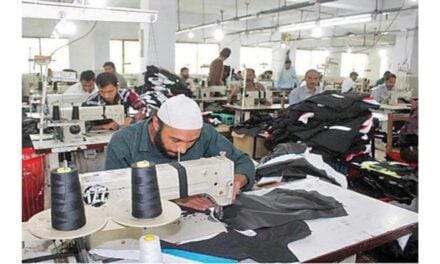 Bangladeshi spinning sector is plagued with multifaceted problems. Spinners are facing huge losses due to reduced demand for yarn, low prices, overstocking of yarn, smuggling and electricity and gas price hike.
Bangladeshi spinning sector is plagued with multifaceted problems. Spinners are facing huge losses due to reduced demand for yarn, low prices, overstocking of yarn, smuggling and electricity and gas price hike.
A slowdown in the global economy has reduced demand for ready-made garments – affecting the yarn market as well. As a result, the spinners of the country are in huge losses. The insiders of this sector said that almost every yarn mill has accumulated excess stock of yarn due to reduced sales. As a result, there is no profit, but an average loss of $0.70 per kg.
Spinning miller said that even after running the factory at 50 to 60 percent capacity, there is a lot of stock of yarn. Orders also fell by about 35 percent. Due to low demand and stockpiles, the price of yarn has also decreased. In the space of two-three weeks, the price of yarn of all counts has decreased by Tk 8-12 per pound.
The demand for yarn in the market has decreased also due to the decrease in the price of yarn raw material in the international market and the production of cloth in the domestic market. And due to this, the price of yarn has decreased.
Looking around the market, 10 count yarn is being sold at Tk 38-65, which was Tk 40-70 per pound even a month ago. As a result, the price has decreased by Tk 5 per pound. While, 20 count yarn is being sold in the market at Tk 60-70, which was Tk 70-80 two weeks ago. Accordingly, the price has decreased by Tk 10 per pound. All count yarns price have been reduced by 10-20 percent.
Besides, there have been allegations of illegal import of textiles including yarn from neighboring countries. Moreover, huge amount of yarn is being imported under duty free facility in the name of weavers’ association, which is being sold in the open market without giving it to the weavers, which is also believed to have increased the crisis of the local textile mills.
Meanwhile, the new increase in the price of electricity and gas has created additional pressure on the entrepreneurs of this gas-based industry. A senior official of a first line textile mill said that earlier the gas bill of the company was Tk 4 crore per month. Now 8.5 crores have to be paid for using the same amount of gas.
Speaking to spinning mill owners, it is said that they do not see any signs of improvement in the order drought situation. Those related to the clothing sector said that they do not have enough purchase orders. That is why they have reduced the purchase of yarn or fabric. If the exports are less, the sale of yarn will naturally decrease and that is what happening now.
According to the Export Promotion Bureau (EPB), exports of ready-made garments fell in April after last March, which is 17 percent compared to the same period of the previous fiscal. Garment exporters say that this decline in exports may continue in the next three to four months.
In such a situation, Bangladesh Textile Mills Association (BTMA), held an emergency meeting last week. Several leaders present in the meeting expressed their concern.
Generally, spinning mills increase the price of yarn from the mill gate when the demand for cloth production increases. As the outbreak of the epidemic subsided in the last year, the demand for clothing increased the price of cotton and the spinning mill owners made good profits. But now, they are facing loss due to these multifaceted problems. As a result, many weavers are switching to other professions.






















